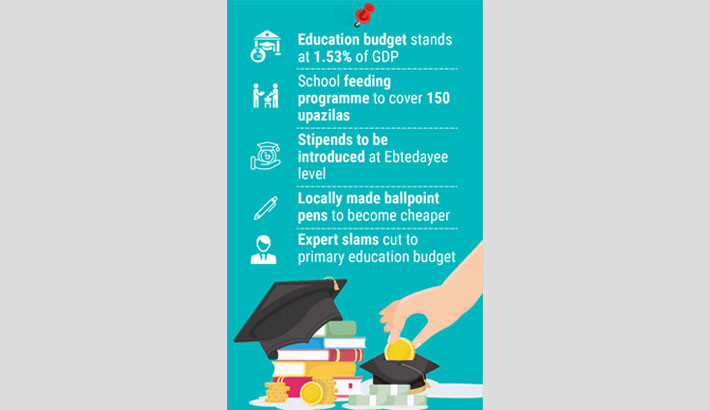Primary education faces cuts despite overall rise in education budget
Asadul Islam, Dhaka
Published: 02 Jun 2025

The government has proposed a total education budget of Tk95,644 crore for the 2025–26 fiscal year, marking an increase of Tk935 crore from the previous year’s allocation of Tk94,710 crore. While allocations for secondary, higher, technical, and madrasa education have seen notable increases, funding for primary education has been significantly reduced.
The allocation for the Ministry of Primary and Mass Education has been slashed to Tk35,403 crore, down from Tk38,816 crore in FY2024–25–a decrease of Tk3,416 crore compared to the originally proposed Tk38,819 crore.
By contrast, the Secondary and Higher Education Division will receive Tk47,564 crore, up Tk3,456 crore from last year’s original allocation of Tk44,108 crore. This also reflects a strong recovery from the revised allocation of Tk39,233 crore in FY2024–25.
The Technical and Madrasa Education Division is set to receive Tk12,678 crore, representing a rise of Tk895 crore from the previous year’s original allocation of Tk11,783 crore. Compared to the revised figure of Tk9,953 crore, the increase is even more substantial.
Additional allocations include Tk1,626 crore for distributing revised textbooks at the secondary and higher secondary levels, and Tk2,164 crore for the Government Primary School Feeding Programme.
On the taxation front, the government has withdrawn VAT exemptions on imported ballpoint pens, while introducing VAT exemptions for locally produced ones–making domestic pens more affordable.
The proposed education budget accounts for 12.1% of the total national budget of Tk790,000 crore for the fiscal year. In terms of Gross Domestic Product (GDP), which stands at Tk62,44,578 crore, the education allocation amounts to 1.53%–well below the 4–6% recommended by UNESCO’s Education 2030 Framework for Action.
Presenting the budget, the Finance Advisor highlighted the importance of science, technology, and technical education in building a resilient economy. He stated that this year’s budget places special emphasis on fostering a science-based, technology-driven, and employment-oriented education system.
Addressing the allocations for secondary and higher education, the Education Advisor noted: “Existing textbooks have been revised and updated to ensure quality education. To modernise higher education and align it with international standards, curricula at all private universities have been updated in line with the globally recognised Outcome-Based Education (OBE) model.”
However, the budget cut for primary and mass education has drawn sharp criticism. Professor Dr Monira Jahan, Director of the Institute of Education and Research at Jagannath University, said: “Education spending as a share of GDP should be higher. Primary education is the foundation of the entire system, and any budget reduction in this sector is unacceptable.”
Welcoming the plan to expand the School Feeding Programme to 150 upazilas, Dr Jahan added: “This initiative will not only help reduce dropout rates but also play a crucial role in ensuring proper nutrition for children in rural and remote areas.” However, she suggested the impact would be even greater if the programme were extended to all districts.
In an immediate response to the proposed budget, Dr Fahmida Khatun, Executive Director of the Centre for Policy Dialogue (CPD), voiced concern over reductions in allocations for essential sectors. Speaking at a press conference, she said: “The Annual Development Programme (ADP) has cut funding for education, health, and agriculture–three critical sectors. This is alarming, as we have consistently called for increased investment in both education and healthcare.”

